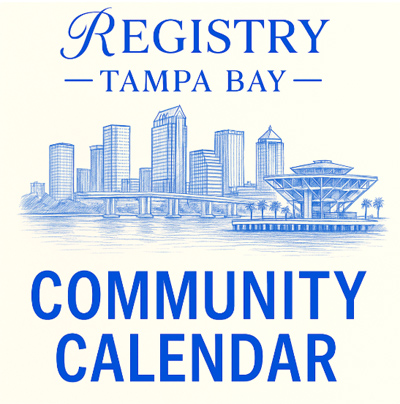Chances are you’ve heard of Lauren Davenport and Daniel Fernandez, and not just because they run a successful healthcare communications firm in St. Petersburg.
It’s because this spring they made international headlines, giving interviews to the New York Times, CBS News with Norah O’Donnell,The Daily Beast, ABC Action News… the list goes on and on.
The upshot: If you’re going to get stranded in Morocco due to a pandemic, it helps if you’re seasoned travelers with great communications skills.

The couple traveled to Spain in late February with Daniel’s father and uncle for a long-planned celebration of his father’s 70th birthday in the homeland of his parents. At the time there were only five announced cases of COVID- 19 in Spain, so the trip seemed safe. By the time they’d been in Barcelona a week, disturbing reports were coming out of Madrid, so the older gentlemen returned to the U.S. and Lauren and Daniel opted to go to Morocco, where no cases were being reported and borders were open.
“We found out after we landed that we were the last flight allowed in,” said Lauren in a phone interview.
But as yet the crisis didn’t seem to be, well, a crisis, so they proceeded with their plans: Spend a few days in Marrakesh, then take a short trip to the Sahara.
“The president treated it like the U.S. had it all under control, so we figured four days in the desert wouldn’t be a problem.”
Let’s take a moment to backtrack. That quick decision to reroute their travel plans? That’s the way Lauren and Daniel roll.
It all started in September, 2018, when the couple was visiting Savannah. One night in their Airbnb, they watched a doc on Netflix called Minimalism: A Documentary About the Important Things — about two successful executives who decided to sell everything and travel the country.
“Back in Tampa Bay, we had a pretty house in South Pasadena that we only used a third of,” Lauren says. “Before we knew it, Daniel and I were asking ourselves, ‘Do we really need this house? We could make good money if we sold it and not have a house anymore. At first it was this random, weird crazy idea, and then the more we started talking about it we realized this could be a real thing.”
The couple met, literally, by Chance (she tripped over his dog, who was named Chance) and married in 2012. Lauren, 31, is an ebullient mix of Southern charm and steely resolve who launched a social media marketing agency while she was still an undergrad at Middle Tennessee State in Nashville and moved to St. Petersburg in 2011 when she realized she’d be better able to expand here. Daniel, 43, is a dedicated marathon runner with long experience in healthcare administration (he was director of marketing for Florida Hospital). Their backgrounds mesh nicely in Symphony, their St. Pete-based communications firm, where 75 percent of the clients are healthcare practices looking to grow in scale through improvements in branding, web presence and internal culture.
Flexibility was important to them from the get-go. So the decision to work remotely — really remotely, from all over the world — came relatively easily. “There were a few key roles we had to replace for ourselves,” says Lauren, “but the majority of what we do from day to day is management of people and high-level strategy,” and those jobs can be done remotely.
So, in January 2019, they embarked on their new life, using credit card points “to fly free almost everywhere,” says Lauren. They’ve been to 20 states and 30 countries so far, staying mostly in Airbnbs and locally-owned hotels, from a converted Conestoga wagon in Zion National Park in Utah to a 727 airplane hotel in the Costa Rican rain forest.
There have been sacrifices, of course. Lauren is active in Tampa Bay civic life, but her itinerant lifestyle has compelled her to resign from most of her board commitments. [Full disclosure: I met her when she was president of the board of Creative Pinellas, where I’m the board secretary.]
But the other hurdles you might expect, like expenses? Not a problem.
“The interesting thing about minimalism,” says Lauren, “is that we have more money living like this than we did before. Usually we’re traveling super-affordably. In Airbnbs we do a shared room in someone’s home for $20 or $40 a night. It’s insanely cheaper than your average mortgage per night.”
Throw in their mastery of airline percs and credit card bonuses and social media, and you see what she means when she says, “We work the system.”
Those skills would come in very handy in Morocco.
Before the couple left for the Sahara, Megan, a friend of Lauren’s who works in public relations, sent her a slightly ominous message: “‘Can you give me a story, short and sweet, in case you guys get stuck in Morocco and need help getting out?’”
When they reached their camp in the desert, Lauren got another message from Megan: “Do you mind if I update the story because the borders are closed?” Which was news to Daniel and Lauren. Meanwhile, Megan sent their story to journalists “while we were riding camels up sand dunes” — and once they were able to get a stronger internet connection (their guide duct-taped a router to the top of a steel pole), Lauren saw that she’d received 100 emails from journalists “wanting to talk today. I thought, ‘Oh, shit. If they’re that interested in that story, we might be in trouble.’”
Which they sort of were. But here’s where their media savvy not only benefited themselves, but also a raft of other stranded travelers.
On the way back to Marrakesh, their phones started to blow up. “The New York Times reporter told us about this Facebook group of U.S. citizens stuck in Morocco. Our hearts started breaking… Our lifestyles are such that it’d be okay for us to be stranded a while, but some of the people in this group were running out of medications they needed to survive.”
So they set out to tell these stranded tourists’ stories, setting up a makeshift studio in the riad (hotel) where they were staying. “For the next 72 hours we did every single news and media interview we could possibly do. Many of these tourists were elderly — and most didn’t have laptops with them…
“Less than 48 hours after the story came out in the New York Times, we got an email from the state department telling us that a rescue flight was coming .”
The rescue flight to London aboard British Airways was like a celebration, with flight attendants walking up and down the aisles with Champagne and passengers reuniting with people they’d met in Morocco. “Four of us who had been in the Times article were all on the same flight.”
The flight home from London to Miami was not without its bumps. In an eerily empty Heathrow, they still had to wait in line for hours, and some people were walking around in homemade hazmat suits, with trashbags over their heads.
But it was when they returned to the U.S. that the nomadic lifestyle turned out to have some unexpected drawbacks, at least during a pandemic:
They couldn’t find an Airbnb that would accept two recent arrivals from Europe.
Finally, they did manage to find a place in Cape Coral, where they quarantined for two weeks, and since that time have moved in with Lauren’s father, who lives in a condo in North St. Pete.
Despite their re-entry difficulties, it’s entirely possible that without the couple’s help, the tourists they met might not have made it home so soon. (There were seven rescue flights out of Morocco on the first day alone.) And once they were back in the U.S., Lauren started getting messages from other places around the world: ‘I’m stuck in Nepal! I’m stuck in Guatemala!’” She and her PR pal Megan helped set up media interviews for as many of these stranded tourists as possible.
“We’ve gotten everyone home,” says Lauren. “Even the lady stuck in Nepal!”
So their nomadic lifestyle was a boon for them?
“1,000 percent,” says Lauren. “It allowed us to be comfortable in a situation that could have been really intense. It was scary — the thought of getting stuck in Africa during a global pandemic, a country that doesn’t necessarily have great healthcare. But [because of this lifestyle] we were able to get shit done.”
Still, in the wake of a harrowing adventure and the prospect of international travel being suspended for a long time, are they reconsidering?
“I will say that in this coronavirus, when we were returning from Morocco, it was the first time I thought it would be nice to have our home back.”
But meanwhile… they’re planning this: A 50-state, 365-day adventure focused on shopping and staying local.
“We know we’d learn a ton.”
Read more stories from duPont REGISTRY Tampa Bay’s Health & Happiness Issue, Summer 2020.










